Unit 7 Know Our World Lesson 37课件(共26张PPT) 2024-2025学年英语冀教版八年级下册
文档属性
| 名称 | Unit 7 Know Our World Lesson 37课件(共26张PPT) 2024-2025学年英语冀教版八年级下册 | 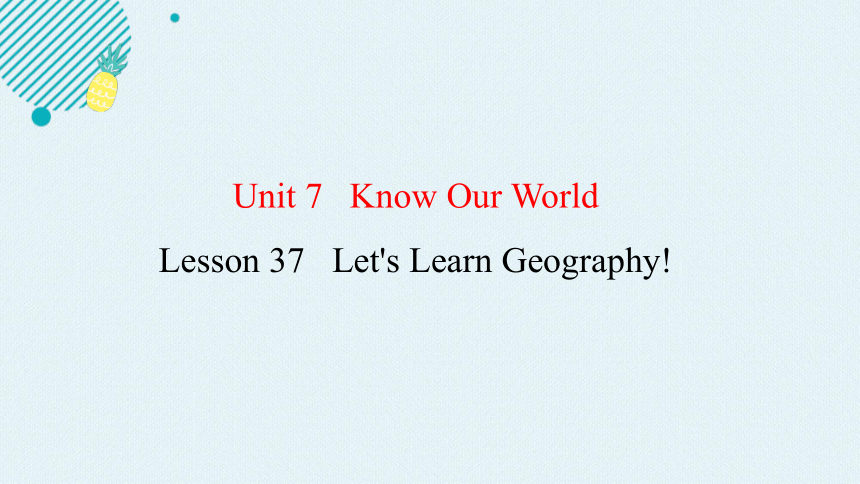 | |
| 格式 | pptx | ||
| 文件大小 | 1.7MB | ||
| 资源类型 | 教案 | ||
| 版本资源 | 冀教版 | ||
| 科目 | 英语 | ||
| 更新时间 | 2025-04-27 15:23:51 | ||
图片预览

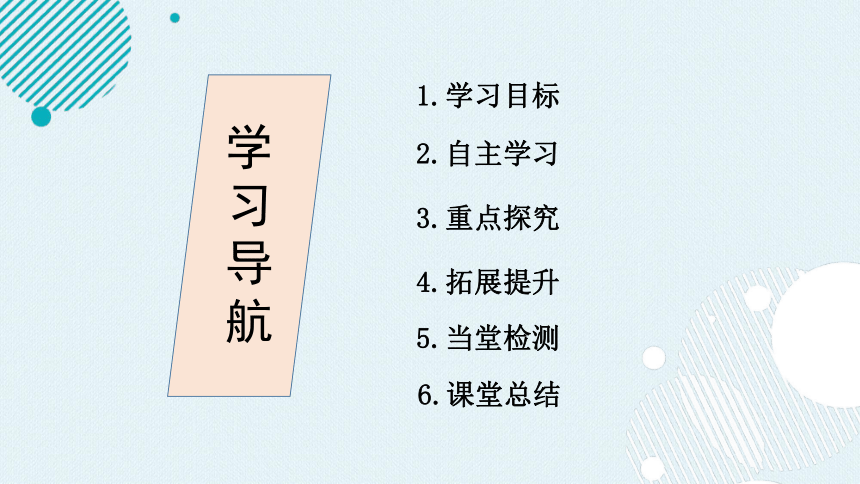

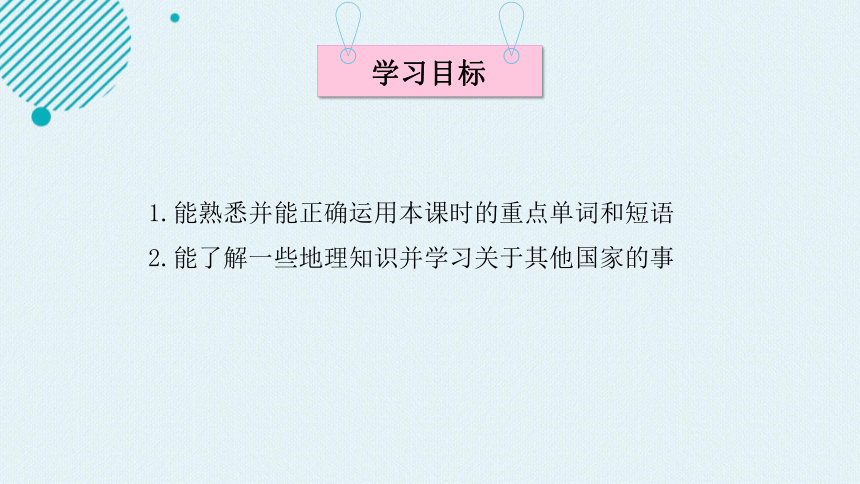
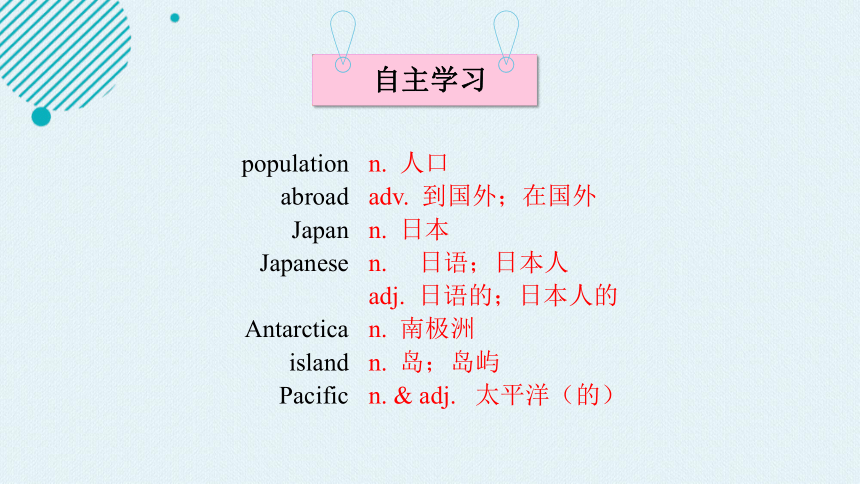

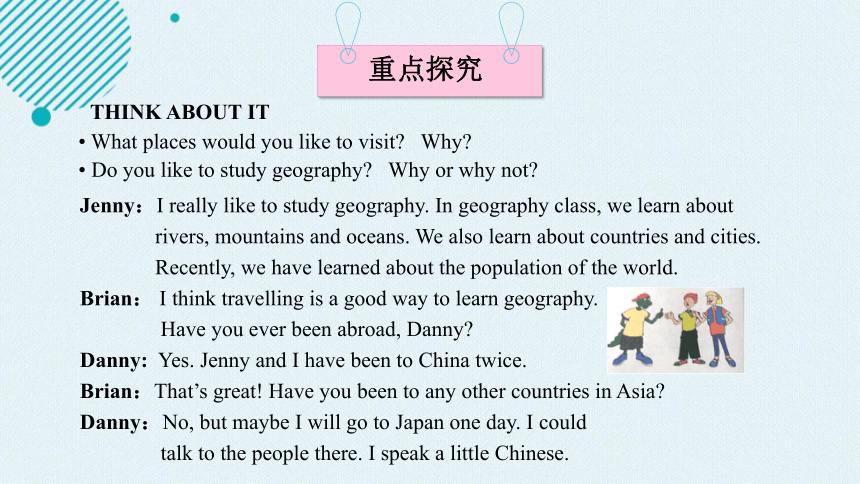
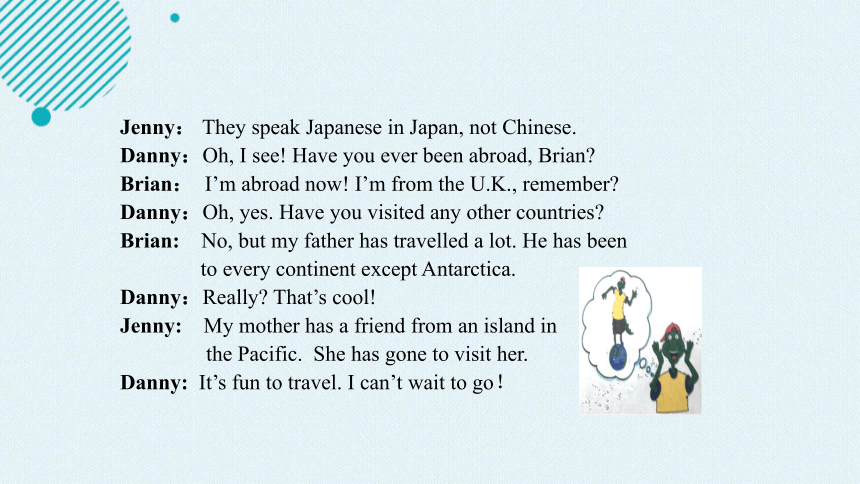
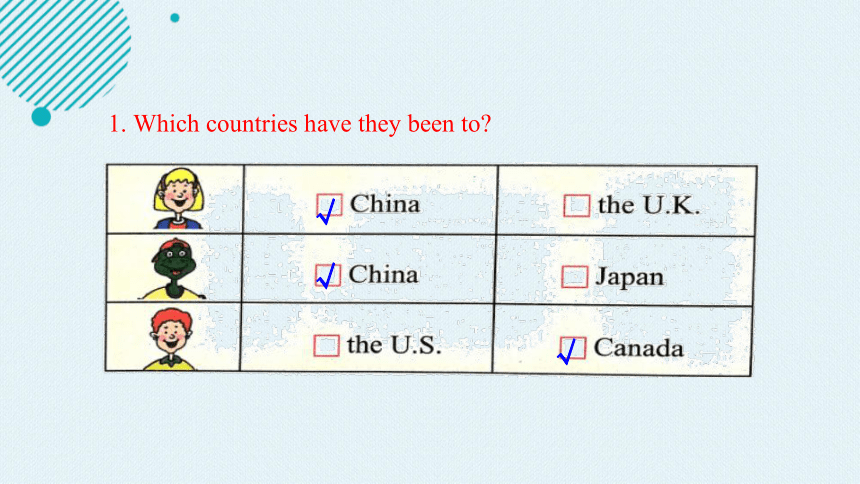
文档简介
(共26张PPT)
Unit 7 Know Our World
Lesson 37 Let's Learn Geography!
1.学习目标
3.重点探究
2.自主学习
学习导航
5.当堂检测
6.课堂总结
4.拓展提升
新课导入
Look at the pictures and guess the countries’ names.
Are they in Asia
学习目标
1.能熟悉并能正确运用本课时的重点单词和短语
2.能了解一些地理知识并学习关于其他国家的事
自主学习
population
abroad
Japan
Japanese
Antarctica
island
Pacific
n. 人口
adv. 到国外;在国外
n. 日本
n. 日语;日本人
adj. 日语的;日本人的
n. 南极洲
n. 岛;岛屿
n. & adj. 太平洋(的)
学习,了解
世界人口
在国外
去过
说汉语
来自
去了 迫不及待做某事
learn about
the population of the world
be abroad
have/has been to
speak Chinese
be from/come from
can't wait to do
have/has gone to
重点探究
Jenny:I really like to study geography. In geography class, we learn about
rivers, mountains and oceans. We also learn about countries and cities.
Recently, we have learned about the population of the world.
Brian: I think travelling is a good way to learn geography.
Have you ever been abroad, Danny
Danny: Yes. Jenny and I have been to China twice.
Brian:That’s great! Have you been to any other countries in Asia
Danny:No, but maybe I will go to Japan one day. I could
talk to the people there. I speak a little Chinese.
THINK ABOUT IT
What places would you like to visit Why
Do you like to study geography Why or why not
Jenny: They speak Japanese in Japan, not Chinese.
Danny:Oh, I see! Have you ever been abroad, Brian
Brian: I’m abroad now! I’m from the U.K., remember
Danny:Oh, yes. Have you visited any other countries
Brian: No, but my father has travelled a lot. He has been
to every continent except Antarctica.
Danny:Really That’s cool!
Jenny: My mother has a friend from an island in
the Pacific. She has gone to visit her.
Danny: It’s fun to travel. I can’t wait to go!
1. Which countries have they been to
√
√
√
2. Read the lesson and write true (T) of false (F).
1). Brian wants to visit Japan someday. ( )
2). Jenny has never been to any Asian countries. ( )
3). Brain’s father has travelled to several different continents. ( )
4). Danny’s mother has a friend in Antarctica. ( )
F
F
T
F
3. Fill in the blanks with the words in this lesson.
The first letter is given.
1).A: Which country has the largest p________?
B: China, of course.
2).A: Is Taiwan an i________?
B: Yes. It is in the Pacific.
3).A: I like all fruits e________bananas.
B: Really I don’t like them, either.
4).Mr. Wang has gone a______, so I won’t see him this week.
5).The people in Japan speak J________.
opulation
sland
xcept
broad
apanese
Task tips:
Have you ever been there
What language do people speak there
Describe some places of interest.
4. What country or place are you most interested in Search
the Internet and find some facts about it. Then share your
information with the class.
拓展提升
表达过去发生的动作对现在产生影响,或过去发生的动作一直持续到现在这两种情况时,常会用到现在完成时。 观察下面的例子,补全“结论”部分所缺的内容。
a. Kate has already / just finished her homework.
b. I have never been to Australia before.
c. —Have you ever eaten fish and chips —Yes, I have. / No, I haven’t.
d. Alice hasn’t cleaned her room yet.
e. David has worked in the factory for five years.
f. They have lived here since 1995.
现在完成时
结论:
1. 观察以上例子可知,现在完成时由“助动词have / has +1). ______________”构成。一般疑问句是直接把have /has提至主语前面;肯定回答:Yes,主语+have / has; 否定回答:No, 主语+haven’t / hasn’t. 否定结构是在2). ________后加not。
2. 现在完成时表示过去发生或已经完成的某一动作对 1) _____ (现在/过去)造成的影响或结果,常与already, just, ever, never, yet, before等副词连用。其中already, just, ever, never常位于2) ________与3)________之间,yet常用于疑问句或否定句的4) ____。
动词的过去分词
have / has
现在
have / has
过去分词
句末
3. 由e、f可知,现在完成时还可表示从过去某一时间开始,一
直持续到现在的动作或状态(谓语动词必须是延续性动词)。
常与for或since引起的时间状语连用;其中for后面接 ________,
since后面接表示点时间的词语或从句。
一段时间
2.Recently, we have learned about the population of the world.
最近,我们已经了解了世界的人口。
population “人口”,看作一个整体,做主语谓语用单数。
例如:世界人口变得越来越多。
The world’s population is getting larger and larger.
人口的“多”用large ;“少”用 small.
例如:哪个国家有最多/少的人口?
Which country has the largest / smallest population
表示“某地” 有多少人口时,一般说:
1)某地+has a population of …
2)The population of +某地 is…
例如:西乡有40万人口。
Xixiang has a population of 400 thousand.
= .
表示“人口有多少 ”,用what提问
例如:北京有多少人口?_______ the population of Beijing
What is
The population of Xixiang is 400 thousand
3. I speak a little Chinese.
1) a little修饰不可数名词, 意为“有一点儿;有一些”,
表示肯定的含义,如:
Don’t worry. There is a little time left.
2) a little 可修饰形容词、副词及比较级, 相当于a bit,如:
I felt a little tired after walking so far.
1) few用来修饰可数名词,few表示否定意义,
意为“没有;几乎没有”。如:
He is new here. He has few friends here.
2) a few也用来修饰可数名词,但它表示肯定意义,
意为“有几个;有一些”。如:
There are a few apples in the basket.
3) little用来修饰不可数名词,little表示否定意义,
意为“没有;几乎没有” 如:
There is little water in the bottle.
4) a little也用来修饰不可数名词,但是它表示肯定意义,
意为“有一点儿”如:
I can speak a little French now with his help.
3. Have you ever been abroad, Danny
be abroad意为“在国外”,go abroad意为“出国”
abroad 是表示地点的副词,其前一般不加介词to,如:
My father is abroad now.
He has been to every continent except Antarctica.
She has gone to visit her.
have / has been to sp. 到过某地,已回
have / has gone to sp. 去了某地,未回
have / has been in sp. 一段时间待在某地
他去过美国三次
He America three times.
他已经去了加拿大
He Canada.
我已经在伦敦待了两年了
I London for two years.
has been to
has gone to
have been in
注意:
1. 遇到四个地点副词去掉 to,这四个地点副词是:
here, there, home, abroad
例如:Mary isn't here, he has gone home.
I have been abroad twice.
Have you ever been there?
2. have/has been in + 一段时间 表示待在某地多长时间
例如:I have been in Gansu for ten years.
当堂检测
Complete the following sentences.
1. I have seen the movie before. (改为否定句)
I _______ _____ the movie before.
2. The concert has started. (改为一般疑问句)
_____ the concert _______
3. Have you finished your homework (否定回答)
_____, I _______.
haven’t seen
Has started
No haven’t
4. 我爸爸去过大连三次。
My dad ____ _____ ____ Dalian three times.
5. 怀特一家人不在家。他们去公园了。
The Whites aren’t at home. They _____ _____ _____ the park.
6. 我已经去过北京动物园好多次了。
I _____ _____ _____ Beijing Zoo several times.
has been to
have gone to
have been to
课堂总结
重点短语:
重点单词:
population
abroad , Japan
Japanese
Antarctica
island, Pacific
Unit 7
Lesson 37
学习,了解
世界的人口
学习地理的一种好法
在国外
出 国
迫不及待干某事
旅行是有趣的
learn about
the population of the world
a good way to learn geography
be abroad
go abroad
can’t wait to do
It’s fun to travel
Unit 7 Know Our World
Lesson 37 Let's Learn Geography!
1.学习目标
3.重点探究
2.自主学习
学习导航
5.当堂检测
6.课堂总结
4.拓展提升
新课导入
Look at the pictures and guess the countries’ names.
Are they in Asia
学习目标
1.能熟悉并能正确运用本课时的重点单词和短语
2.能了解一些地理知识并学习关于其他国家的事
自主学习
population
abroad
Japan
Japanese
Antarctica
island
Pacific
n. 人口
adv. 到国外;在国外
n. 日本
n. 日语;日本人
adj. 日语的;日本人的
n. 南极洲
n. 岛;岛屿
n. & adj. 太平洋(的)
学习,了解
世界人口
在国外
去过
说汉语
来自
去了 迫不及待做某事
learn about
the population of the world
be abroad
have/has been to
speak Chinese
be from/come from
can't wait to do
have/has gone to
重点探究
Jenny:I really like to study geography. In geography class, we learn about
rivers, mountains and oceans. We also learn about countries and cities.
Recently, we have learned about the population of the world.
Brian: I think travelling is a good way to learn geography.
Have you ever been abroad, Danny
Danny: Yes. Jenny and I have been to China twice.
Brian:That’s great! Have you been to any other countries in Asia
Danny:No, but maybe I will go to Japan one day. I could
talk to the people there. I speak a little Chinese.
THINK ABOUT IT
What places would you like to visit Why
Do you like to study geography Why or why not
Jenny: They speak Japanese in Japan, not Chinese.
Danny:Oh, I see! Have you ever been abroad, Brian
Brian: I’m abroad now! I’m from the U.K., remember
Danny:Oh, yes. Have you visited any other countries
Brian: No, but my father has travelled a lot. He has been
to every continent except Antarctica.
Danny:Really That’s cool!
Jenny: My mother has a friend from an island in
the Pacific. She has gone to visit her.
Danny: It’s fun to travel. I can’t wait to go!
1. Which countries have they been to
√
√
√
2. Read the lesson and write true (T) of false (F).
1). Brian wants to visit Japan someday. ( )
2). Jenny has never been to any Asian countries. ( )
3). Brain’s father has travelled to several different continents. ( )
4). Danny’s mother has a friend in Antarctica. ( )
F
F
T
F
3. Fill in the blanks with the words in this lesson.
The first letter is given.
1).A: Which country has the largest p________?
B: China, of course.
2).A: Is Taiwan an i________?
B: Yes. It is in the Pacific.
3).A: I like all fruits e________bananas.
B: Really I don’t like them, either.
4).Mr. Wang has gone a______, so I won’t see him this week.
5).The people in Japan speak J________.
opulation
sland
xcept
broad
apanese
Task tips:
Have you ever been there
What language do people speak there
Describe some places of interest.
4. What country or place are you most interested in Search
the Internet and find some facts about it. Then share your
information with the class.
拓展提升
表达过去发生的动作对现在产生影响,或过去发生的动作一直持续到现在这两种情况时,常会用到现在完成时。 观察下面的例子,补全“结论”部分所缺的内容。
a. Kate has already / just finished her homework.
b. I have never been to Australia before.
c. —Have you ever eaten fish and chips —Yes, I have. / No, I haven’t.
d. Alice hasn’t cleaned her room yet.
e. David has worked in the factory for five years.
f. They have lived here since 1995.
现在完成时
结论:
1. 观察以上例子可知,现在完成时由“助动词have / has +1). ______________”构成。一般疑问句是直接把have /has提至主语前面;肯定回答:Yes,主语+have / has; 否定回答:No, 主语+haven’t / hasn’t. 否定结构是在2). ________后加not。
2. 现在完成时表示过去发生或已经完成的某一动作对 1) _____ (现在/过去)造成的影响或结果,常与already, just, ever, never, yet, before等副词连用。其中already, just, ever, never常位于2) ________与3)________之间,yet常用于疑问句或否定句的4) ____。
动词的过去分词
have / has
现在
have / has
过去分词
句末
3. 由e、f可知,现在完成时还可表示从过去某一时间开始,一
直持续到现在的动作或状态(谓语动词必须是延续性动词)。
常与for或since引起的时间状语连用;其中for后面接 ________,
since后面接表示点时间的词语或从句。
一段时间
2.Recently, we have learned about the population of the world.
最近,我们已经了解了世界的人口。
population “人口”,看作一个整体,做主语谓语用单数。
例如:世界人口变得越来越多。
The world’s population is getting larger and larger.
人口的“多”用large ;“少”用 small.
例如:哪个国家有最多/少的人口?
Which country has the largest / smallest population
表示“某地” 有多少人口时,一般说:
1)某地+has a population of …
2)The population of +某地 is…
例如:西乡有40万人口。
Xixiang has a population of 400 thousand.
= .
表示“人口有多少 ”,用what提问
例如:北京有多少人口?_______ the population of Beijing
What is
The population of Xixiang is 400 thousand
3. I speak a little Chinese.
1) a little修饰不可数名词, 意为“有一点儿;有一些”,
表示肯定的含义,如:
Don’t worry. There is a little time left.
2) a little 可修饰形容词、副词及比较级, 相当于a bit,如:
I felt a little tired after walking so far.
1) few用来修饰可数名词,few表示否定意义,
意为“没有;几乎没有”。如:
He is new here. He has few friends here.
2) a few也用来修饰可数名词,但它表示肯定意义,
意为“有几个;有一些”。如:
There are a few apples in the basket.
3) little用来修饰不可数名词,little表示否定意义,
意为“没有;几乎没有” 如:
There is little water in the bottle.
4) a little也用来修饰不可数名词,但是它表示肯定意义,
意为“有一点儿”如:
I can speak a little French now with his help.
3. Have you ever been abroad, Danny
be abroad意为“在国外”,go abroad意为“出国”
abroad 是表示地点的副词,其前一般不加介词to,如:
My father is abroad now.
He has been to every continent except Antarctica.
She has gone to visit her.
have / has been to sp. 到过某地,已回
have / has gone to sp. 去了某地,未回
have / has been in sp. 一段时间待在某地
他去过美国三次
He America three times.
他已经去了加拿大
He Canada.
我已经在伦敦待了两年了
I London for two years.
has been to
has gone to
have been in
注意:
1. 遇到四个地点副词去掉 to,这四个地点副词是:
here, there, home, abroad
例如:Mary isn't here, he has gone home.
I have been abroad twice.
Have you ever been there?
2. have/has been in + 一段时间 表示待在某地多长时间
例如:I have been in Gansu for ten years.
当堂检测
Complete the following sentences.
1. I have seen the movie before. (改为否定句)
I _______ _____ the movie before.
2. The concert has started. (改为一般疑问句)
_____ the concert _______
3. Have you finished your homework (否定回答)
_____, I _______.
haven’t seen
Has started
No haven’t
4. 我爸爸去过大连三次。
My dad ____ _____ ____ Dalian three times.
5. 怀特一家人不在家。他们去公园了。
The Whites aren’t at home. They _____ _____ _____ the park.
6. 我已经去过北京动物园好多次了。
I _____ _____ _____ Beijing Zoo several times.
has been to
have gone to
have been to
课堂总结
重点短语:
重点单词:
population
abroad , Japan
Japanese
Antarctica
island, Pacific
Unit 7
Lesson 37
学习,了解
世界的人口
学习地理的一种好法
在国外
出 国
迫不及待干某事
旅行是有趣的
learn about
the population of the world
a good way to learn geography
be abroad
go abroad
can’t wait to do
It’s fun to travel
同课章节目录
- Unit 1 Spring Is Coming
- Lesson 1 How's the weather?
- Lesson 2 It's Getting Warmer!
- Lesson 3 Sun Is Rising
- Lesson 4 The Spring City
- Lesson 5 Babysitting on a Spring Day
- Lesson 6 Stories about Spring
- Unit 2 Plant a Plant
- Lesson 7 Planting Trees
- Lesson 8 Why Are Plants Important?
- Lesson 9 Gardening with Mary
- Lesson 10 Make Your Garden Grow!
- Lesson 11 Amazing Plants
- Lesson 12 Danny's Plant
- Unit 3 Animals Are Our Friends
- Lesson 13 Danny's Big Scare
- Lesson 14 Amazing Animals
- Lesson 15 The Zoo Is Open
- Lesson 16 The Pear Escaped
- Lesson 17 Save the Tigers
- Lesson 18 Friendship Between Animals
- Unit 4 The Internet Connects Us
- Lesson 19 How Do You Use the Internet?
- Lesson 20 A Computer Helps!
- Lesson 21 Books or Computers?
- Lesson 22 Travel on the Internet
- Lesson 23 The Internet--Good or Bad?
- Lesson 24 An E-mail to Grandpa
- Unit 5 Buying and Selling
- Lesson 25 Raising Money
- Lesson 26 Cookies, Please!
- Lesson 27 Business English
- Lesson 28 Ms. Liu's Great Idea
- Lesson 29 How to Push a Product
- Lesson 30 A Cookie Sale
- Unit 6 Be a Champion!
- Lesson 31 Don't Fall, Danny
- Lesson 32 My Favourite Record
- Lesson 33 2800 Years of Sports
- Lesson 34 Modern Olympics
- Lesson 35 The Dream Team
- Lesson 36 Classroom Olympics
- Unit 7 Know Our World
- Lesson 37 Let's Learn Geography!
- Lesson 38 The World Is a Big Place
- Lesson 39 Ring Up or Call?
- Lesson 40 Body Language
- Lesson 41 A Class of the World
- Lesson 42 North America
- Unit 8 Save Our World
- Lesson 43 Let's Clean Up!
- Lesson 44 Environment Clubs
- Lesson 45 Let's Sort Garbage!
- Lesson 46 Protect Our Environment
- Lesson 47 Connected to Nature
- Lesson 48 Garbage Is Interesting!
